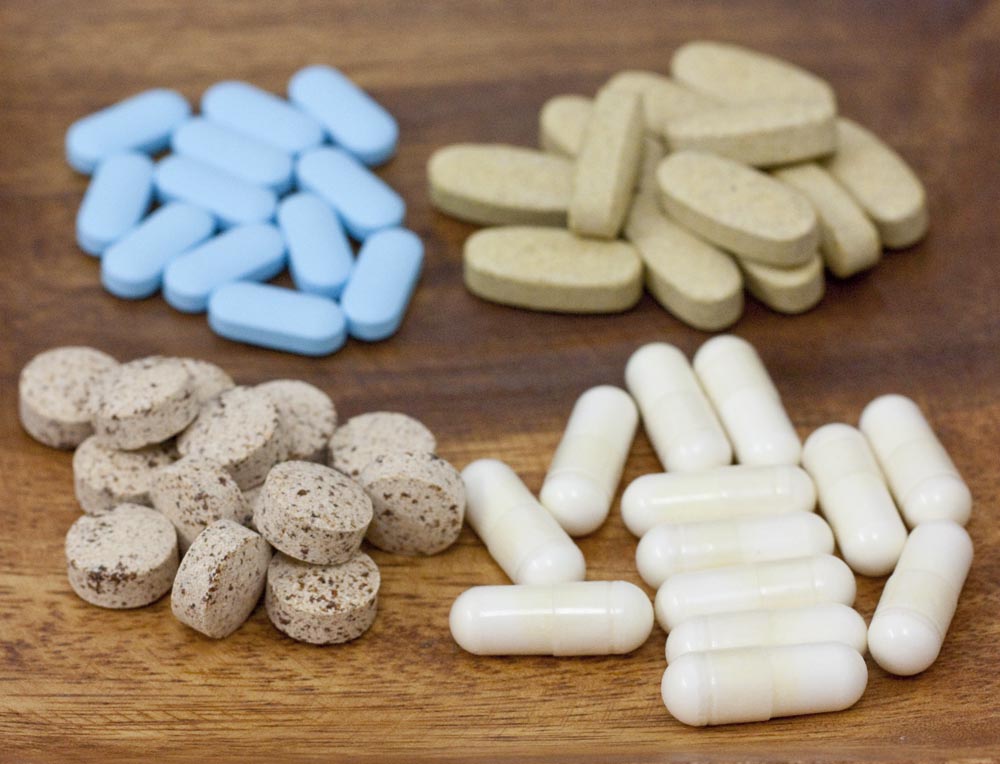
Antibiotics cause many problems for the food animals we eat and directly for us. Many of those problems are just beginning to come to light. Always question the medical necessity of any antibiotic prescription.
Antibiotics as food animal dietary supplements
“Obama Takes Antibiotic Fight From Pharmacy To Farm” by WebMD.com and “FDA Puts Antibiotics For Food Animals Under Vet’s Supervision” by WebMD.com: http://www.webmd.com/news/20150603/obama-antibiotic-pharmacy-farm?src=RSS_PUBLIC and http://www.webmd.com/food-recipes/20150602/fda-puts-antibiotics-for-food-animals-under-vets-supervision?src=RSS_PUBLIC
The US government, through the FDA, is finally beginning to take meaningful action to curb the overuse of antibiotics in food animals. Within a few years, any antibiotics given to food animals will need to be prescribed by a licensed veterinarian for sound medical reasons. No more antibiotics will be allowed as routine additions to food or water for purposes of promoting faster growth or preventing disease. This action is bolstered by a presidential directive that federally funded food cafeterias begin purchasing and serving meat raised with sound antibiotic practices. The president’s directive should provide financial support for the FDA’s new rules.
Antibiotics as dietary supplements for food animals became a common practice in the US when food producers realized the animals would grow faster and could therefore be harvested younger, increasing yearly production and profit. A few decades ago, common antibiotics became very cheap and all bacteria were seen as bad. Eliminating all bacteria became the goal and increased profit was the bonus.
Animals might indeed grow faster when regularly fed antibiotics but are less healthy as a result. This fact is covered up by slaughtering them at a younger age(because of increased growth rates). There is also the fact that antibiotics fed to our food animals is still present in their meat at slaughter and when we eat it are passing those same antibiotics(not all approved for human use) directly to us. The consequences of this have not been widely studied by anyone.
These above steps to limit antibiotic use in food animals are important for many reasons. The routine overuse of antibiotics as dietary supplements for food animals is seen by many to be a driving force behind the development of more and more powerful antibiotic-resistant bacteria. Not only do the animals provide a breeding ground for these dangerous bacteria, but their wastes spread that potential to a much wider area. Like humans, food animals excrete antibiotics through their urine and feces. The excreted antibiotics can then contaminate the surrounding soil and water, giving resistant bacteria a much wider breeding ground.
This problem has been growing year by year. Antibiotic-resistant bacteria are no longer an occasional and widely separated threat to individuals. These dangerous bacteria have become entrenched in some hospitals and continue to spread. The death toll continues to climb and many others suffer ruined lives because of drug-resistant bacteria.
Other problems of antibiotic use
The medical community needs to tackle the issue of over-use of antibiotics for humans next. Too many prescriptions for antibiotics are written every year. Many common illnesses are caused by viruses which antibiotics have no effect on. But people insist the doctor give them something, even if it will do no good. Doctors give in and write a prescription for an antibiotic because it is easier and quicker than arguing with the patients and assume no harm is done. This turns our own bodies into potential breeding grounds for resistant bacteria and we spread more antibiotics through the wider ecosystem via contaminated urine and feces. No sewer or water treatment facilities are currently designed to remove these drugs.
The health issues caused by antibiotic treatment are much larger and potentially much more serious than resistant “super bugs”. Research during the past decade has turned up more and more evidence of just how important the thousands of species of bacteria that live in and on our bodies are to our health. The “good” bacteria on our skin play a vital role in protecting us from infection with disease-causing “bad” bacteria by denying the bad bacteria living space and food for growth. The good bacteria inside our digestive tracts keep bad bacteria under control in the same way: by outnumbering and out-competing them for resources. Keeping our naturally occurring good bacterial populations healthy is vital to good health. Antibiotics interfere with this finely tuned system and we don’t yet know the full health consequences.
We have also learned that our bodies have actually turned control of many important processes over to our bacteria. Much of our immune system response, ability to recognize “bad” bacteria and defend against them, proper digestion and absorption of nutrients is controlled by our resident bacteria. Bacteria even produce a significant fraction of some essential vitamins(especially B-vitamins) right inside our gut as byproducts of their own metabolism.
Every course of prescribed antibiotic drugs we take throws our resident bacterial populations out of balance and gives the “bad” bacteria a greater chance to gain the advantage, causing health problems. Antibiotics are indiscriminate killers, eliminating all bacteria including those that are beneficial. Every doctor knows that almost every illness or infection caused by bacteria will be cleared up by natural processes within a few days to a few weeks without using any drugs. The body and its natural bacterial residents simply need a little time to do their work and bring things back into balance. This does not usually mean elimination of the bad bacteria, just reducing them to normal, non-harmful levels again.
Newer research is also bringing to light how difficult it is for our bacteria to regain their natural, health-promoting populations and balance after even a single course of antibiotics. Instead of thousands or tens of thousands of different bacteria, we may only regain a stable population of hundreds of varieties after taking antibiotics. This is coming to be seen as a possible cause of many immune- and digestive-related health issues. Asthma, seasonal allergies, irritable bowel disease, gluten intolerance and many others are probably directly related to the health and variety of our resident bacteria. We spend tens of billions of dollars annually to treat the symptoms of these bacteria-related health problems.
The biggest problem is so many of us being taken in by the advertisements of drug companies, convincing us there is a pill for every problem. Too many people, at the first signs of a runny nose, sneezies, soreness or aching muscles, will reach for a pill or other medication to “cure” the problem. All of the common medications only treat the symptoms at best and generally do nothing at all. But the pervasive advertising makes us feel guilty or come under the ridicule of others if we insist on simply riding out such minor and natural illnesses without taking drugs.

When it comes to antibiotics, or any drugs, keep the big picture in mind. Ask what the drug is going to do for you and also what it is going to do to you and the environment.
Solutions to the current antibiotic problem
The steps just taken by the FDA and president are very good first steps towards limiting the use of antibiotics when they provide no actual health advantages, to us or to the animals we eat. Our government’s regulatory agencies must be willing and able to stand against the inevitable backlash against these new rules by the food industry, which will undoubtedly claim unnecessary interference in private business and added expense/reduced profit. Neither of these claims hold up in light of the problems being caused by indiscriminate antibiotic use.
The medical community must also take a stand on this issue. Doctors need to start receiving the support and education needed to refuse unnecessary antibiotic prescriptions in the face of patient demand for them. They also need to understand why it is so important to do so.
The major medical organizations and regulatory bodies need to get behind this and provide education to the public to reduce demand for antibiotics when they will provide no health benefits to the patient. A big part of this will be convincing patients that there really is not an appropriate drug for every minor illness and their bodies are capable of curing themselves. People also need to be told by authority figures in medicine that there are serious health side effects with almost every drug that can be much worse than the illness it treats.
Like the government, the medical community has to be willing and able to stand up to the backlash from pharmaceutical companies that will ensue. Pharmaceutical companies exist to sell drugs and make a profit, the more the better. Any new government regulations or guidelines from medical authorities will bring claims of interference in private commerce, reduced sales and profits, lost jobs, etc… But doctors are supposed to put our health above all else and should be able to refute these claims using currently available evidence.
What we can do about overuse of antibiotics
We should all, as individuals, start making the decision to talk to our doctors in more depth about antibiotics. Stop asking for antibiotics; if your doctor thinks antibiotics will help with a condition, let it be the doctor’s suggestion. If your doctor does suggest antibiotics, ask if they are really necessary or if it is just an “it might possibly help” prescription. Explain your concerns and ask if a real danger is posed by not taking antibiotics.
If you have reached the decision along with your doctor that antibiotics are necessary, take the entire recommended course of medication. Stopping the drug early when symptoms start to ease is the surest way to encourage formation of resistant strains of bacteria. This situation is most likely to leave some of the harmful bacteria still alive, the toughest and most resistant strains. The strains of harmful bacteria present that are most susceptible will always be the first killed. This is a vicious circle.
Do your best to keep your natural resident good bacteria populations healthy and happy. This is the best defense against infection by any harmful bacteria. The best way to do this is with a healthy whole food diet and regular servings of “living” food containing helpful bacteria, such as yogurt, kefir, kombucha, sauerkraut, kimchi, etc… In health as in other aspects of life, a good offense is usually much better than a the best defense at warding off illness.

